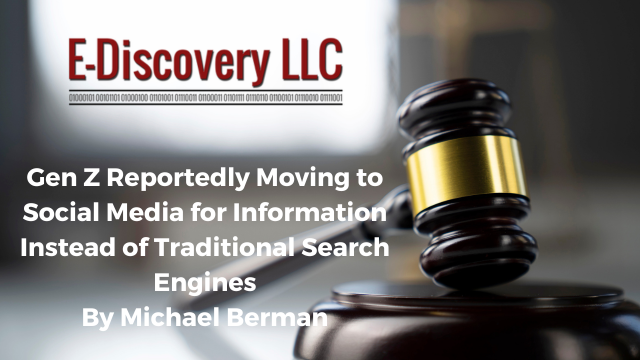
[EDRM Editor’s Note: The opinions and positions are those of Michael Berman.]
Katherin Haan reported in Is Social Media The New Google? Gen Z Turn To Google 25% Less Than Gen X When Searching – Forbes Advisor (May 31, 2024), that a recent study by Forbes and Talker Research “reveal[ed] that people have changed how they engage with both content and commerce online.” Forbes wrote:
There’s a significant movement towards using social media platforms for more than just social interactions; platforms such as TikTok and Facebook Marketplace have become vital search and shopping tools. With 24% of participants using these apps in ways traditionally reserved for search engines, and 13% purchasing directly within these apps, the need for businesses to integrate social media into their digital strategies becomes clear. [emphasis added].
The article states that some of the change is generational: “There is a decline of 25%, on average, in using Google for search between Generation Z and Generation X….” Further, “there is a 30% decline in using search engines for this purpose between Baby Boomers (94%) and Generation Z (64%) in 2024….” Id.
Ms. Haan explained:
The nuances in digital behavior made a dramatic shift in 2024, but even more so in the way different generations approach internet usage. Generational gaps in technology use are widening, with Generation Z showing a marked decrease of 25% in Google usage compared to Generation X. This data points to a significant evolution in search habits, as younger users pivot to alternatives that better suit their informational needs and lifestyles. [emphasis added].
Thus, “[s]ocial media platforms are no longer just for connectivity but have evolved into primary search tools for a quarter of the population.” The Talker Research study showed that:
TikTok, in particular, has risen as a favored resource over Google for Generation Z, indicating a preference for the quick, visually driven content the platform offers.
The study also shows a 30% decline in the use of search engines for brand discovery among Generation Z compared to Baby Boomers, suggesting a shift towards finding brands directly through social media channels.
Much of the change is, according to this study, related to commercial activities, but for Gen Z, it is also “informational”: “This trend intensifies among younger users. For Generation Z, 46% primarily turn to social media for their informational needs, putting their preference for the platforms where they already spend much of their time. Millennials follow this pattern, with 35% favoring social media over traditional search engines.” Id. (emphasis added).
[s]ocial media platforms are no longer just for connectivity but have evolved into primary search tools for a quarter of the population.
Katherin Haan, Is Social Media The New Google? Gen Z Turn To Google 25% Less Than Gen X When Searching – Forbes Advisor (May 31, 2024).
Justice Cardozo wrote: “Nothing is stable. Nothing absolute. All is fluid and changeable. There is an endless ‘becoming.’” B. Cardozo, The Nature of Judicial Process 28 (Yale 1921).
“Chronocentricity” is “the egotism that one’s own generation is poised on the very cusp of history.” T. Standage, “The Victorian Internet” (Walker & Co. 1998, 2007), 213 n. 7.
We have moved from letters to telegrams to fax machines to email to texts to chats to collaboration platforms to “modern attachments,” and more. See, e.g., ESI Protocol Dispute – “Modern Attachments” and the “Humpty Dumpty Issue” (Apr. 29, 2024).
It was bound to happen. Just as email and text messages replaced “snail mail,” social media made face-to-face communications passé, and the internet rendered libraries all but obsolete, it was only a matter of time before “electronic cigarettes” replaced combustible tobacco products as a desirable means of nicotine delivery. As it turns out, even addiction has become electronic.
Am. Acad. of Pediatrics v. Food & Drug Admin., 379 F. Supp. 3d 461, 467 (D. Md. 2019)(Grimm, J.).
Litigators are going to need to adapt to these changing habits when they consider preservation, collection, and search. “Hey, client, how do you use Tik Tok? Did you search for relevant information there? Do we need to preserve your Facebook Marketplace searches?”
For those in need of generational definitions, Here Are the Age Ranges for Millennials, Gen Z, and Gen Alpha (mentalfloss.com) (Feb. 22, 2024). “Zoomers” were born between 1997 and 2012.


